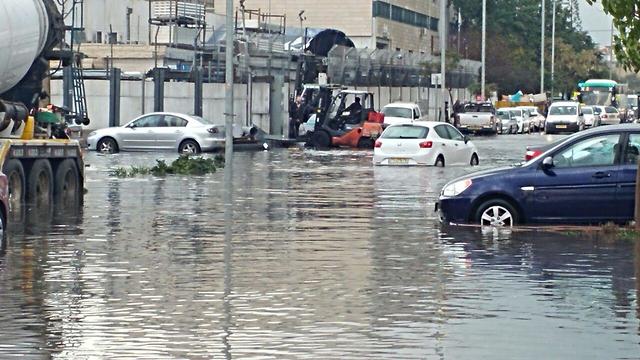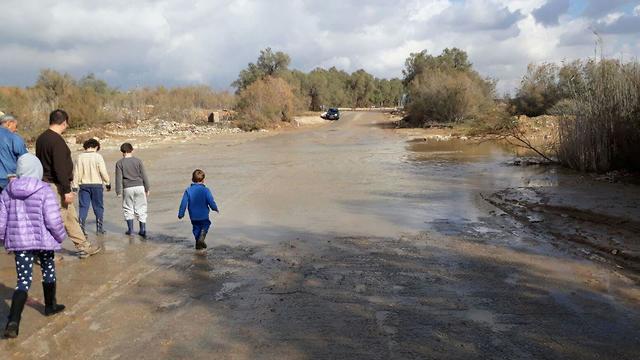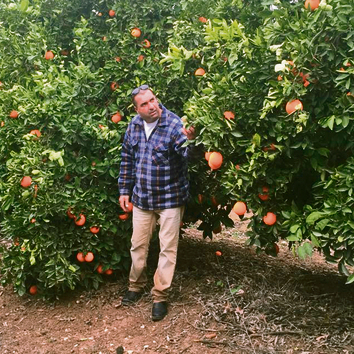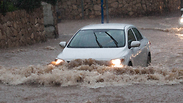

Despite massive rainfall, immense deficit persists in Kinneret, water reserves
Last week saw heavy rainfall nationwide, with many areas surpassing their multiyear average for the season; Kinneret also saw 84mm of rain, but it remains closer to lowermost black line than to red line, while water reserves still lack more than a billion cubic meters of water.
Last week was one of the rainiest recorded in Israel in the past few years, but the country's water situation is still dire. Israel's national water company Mekorot said the cumulative deficit in the country's natural water reserves was at a ten-year low, whereas the sweet water Lake Kinneret was still more than a meter below the red line.
The water company's ominous statements notwithstanding, last week's downpour turned the precipitation picture on its head. Zikhron Ya'akov, for instance, saw 156 millimeters of rainfall with a total of 411 mm since the rainy season began—a 123 percent increase compared to the average up to that time.
The Jezreel Valley, northern Golan Heights, Upper Galilee, Netanya and other regions saw enough rainfall in the last week alone equal to the multiyear average.
However, that is still not enough. Mekorot said that Israel's reserves still lacked more than a billion cubic meters of water as of late 2017, and that according to forecasts the shortage was expected to balloon by an additional 20 percent in 2018.
The water company consequently cautioned that the western Galilee's drinking water supply had reached the limits of its capacity, and unless infrastructures were strengthened and a desalination plant was created the area's residents will find themselves in dire straits.
Mekorot has also carried out ten cloud seeding runs—an artificial method of creating increased precipitation—over the Kinneret's drainage basin during last week's storms.
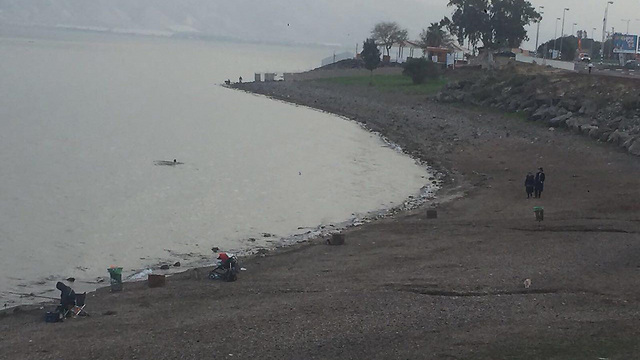
The Israel Water Authority, meanwhile, said recent rainfall had increased the Kinneret's level by nine centimeters since Saturday and by 15cm since Thursday. The lake's level was measured to be -214.01 Saturday morning.
Due to the serious shortage, however, the level was still well below the lower red line, whereas a completely full Kinneret was missing 5.21 meters. The black line, the lowest level measured in the last century, was lamentably much closer—with the Kinneret only 86cm away from it.
The Authority further said that despite fair amounts of rainfall last week, its impact on the Kinneret's water levels and on aquifers was still limited, and that Israel's water shortage was still enormous after four years of drought.
Unless the country sees significant amount of rainfall in February, the Authority cautioned, it may adversely affect its ability to allocate water for agriculture and public gardens.
The greatest variable, then, remained February's precipitation. An American model predicted the second month of 2018 will be close to average rain-wise, but a competing European model showed that at least the first half of the month will be arid.
Regardless of weather forecasting models, Mekorot said Israel still needed roughly 30 more days of significant rainfall merely to reach last year's rainfall—a year that was not inundated with rain to begin with and was deemed a drought year.
Even if February met expectations and staved off drought, "the Kinneret was still missing more than a billion cubic meters, and that's not a difference that February could make up," said Water Authority head Giora Shacham.
"Weather systems are chaotic. Everyone's talking about climate change, and it's very hard to know what the future holds," he said. "All due respect to models, when you examine reality, we're missing a lot of water and we're making decisions under conditions of uncertainty."
One segment of the Israel's populace was elated with last week's rainfall—Israeli farmers who were nearing their breaking point. "It's amazing," said Avi Maoz of the northern Marom Golan community, who prayed for rain in the Western Wall two weeks ago.
"The apples, pears, nectarines, cherries—all received a healthy dose of cold and snow, which was precisely what we needed," he explained.
Farmers in the Hula Valley were also pleased. "I was pleasantly surprised," said Shimon Bitton of the Hulata kibbutz. "It was a pleasure seeing streams gushing. Everything's saturated and flooded and it warms the heart. Only someone who grew up as a farmer can understand. We welcome every droplet of rain with open arms."
"The massive rainfall to hit our country over the past few days allowed us to refrain from declaring this a drought year," Energy Minister Yuval Steinitz said over the weekend. "There is still a dramatic shortage in our natural water reserves, however, and the Kinneret is expected to go below the black line this summer, for the first time in its history."
"This means we have to continue the program to upgrade the national water system, including creating new desalination plants, in order to tackle climate changes and provide water to both the population and the agricultural sector," he concluded.
Ahiya Raved, Ilana Curiel, Amir Ben-David and Goel Beno contributed to this report.














